Don't Worry Darling

This psychological thriller features a fantastic lead performance from Florence Pugh, impressive production design, and visually inventive direction and cinematography, but ultimately, the script lets the film down in the final act and fails to fully realise the potential of the film’s themes.
Premise: Young couple Alice (Florence Pugh) and Jack (Harry Styles) are deeply in love, living their happy suburban life in a 1950s company town in the Californian desert. But after one of their neighbours has a mental breakdown, Alice begins to suffer hallucinations herself and starts to suspect that neither the town nor its enigmatic founder, Frank (Chris Pine), are quite what they appear to be.
Review:
Plotwise, it’s likely that most viewers will have an idea what, broadly speaking, is the secret at the heart of Don't Worry Darling – yet when that secret is finally revealed, it manages somehow to be both underwhelming and unexpectedly far-fetched. And that, in many respects, encapsulates the movie as a whole, which at times can be boldly inventive and daringly provocative, and yet at other times can feel derivative and predictable.
At its core, the film is primarily told through the eyes of Alice (Florence Pugh), a young 1950s housewife who lives in a seemingly perfect Californian company town with her husband Jack (Harry Styles). Styles is perfectly good in his role, but he and all of the other characters are in very much supporting roles, with Pugh being unquestionably the lead of the film. The film is told almost entirely from Alice’s subjective perspective, meaning that Pugh essentially has to carry the entire film on her back.
“…Florence Pugh gives a tour de force performance throughout…”
Of course, it probably comes as no surprise to those already familiar with Florence Pugh’s résumé that she is more than up to the task. But whereas she recently got to show off more of her fun and humorous side in films like Fighting With My Family and Black Widow, here she delves much deeper into her character’s psyche, as Alice begins to doubt her own sanity as she starts to see things that she knows simply can’t be real. Florence Pugh gives an amazing performance during the course of Don’t Worry Darling, capturing the deterioration of Alice’s fragile mental state perfectly.
The rest of the cast play their parts well – including Chris Pine as the town’s cult-leader-esque founder, Gemma Chan as his loyal trophy wife, and Olivia Wilde as Alice’s neighbour and best friend – but they all dip in and out of the storyline as they interact with Alice, whereas Florence Pugh is essentially in every scene of the movie, giving a tour de force performance throughout. Despite being the second billed character, Harry Styles doesn’t get nearly as much to do as Alice’s husband Jack, although he is able to convincingly portray the charisma and suaveness that his character needs. But between this and his even smaller roles in Dunkirk and Eternals, it remains to be seen whether he is the real deal when it comes to playing a larger role.
“…Olivia Wilde’s direction captures the heightened reality of Alice’s perception of events…”
Looking at the other positives, the film also looks amazing. The production design is incredible, making every detail of the 1950s company town feel authentic and lived in, while the direction from Olivia Wilde (this being only her second directorial effort after the success of 2019’s Booksmart) brings everything to life in a vibrant, colour saturated way that captures not only the tone of the era, but also the heightened reality of Alice’s perception of events.
Unfortunately, for all its good points, Don’t Worry Darling ultimately feels like it drops a couple of balls in its final act. Firstly, from a plot perspective, there is a sense that after the third act reveal, the resolution of the movie is at best a little anticlimactic, and at worst, a little muddled. But more than that, while the film touches on several important and interesting themes – including the patriarchy, coercive relationships, and radicalisation – it never actually addresses these big ideas in any detail. The end result is a film that feels like it wants to start a conversation about these themes and issues, but its reach doesn’t match its ambition, and ultimately it doesn’t have much to say beyond some very first base observations.
“…had the potential to say so much more on a variety of issues than it actually says…”
That said, Don’t Worry Darling is far from the disappointment that some would have you believe. Yes, the plot is a bit of a let down in the final act, and you may get the sense that the film had the potential to say so much more on a variety of issues than it actually says, but none of that makes it an inherently bad film. The film is worth seeing for Florence Pugh’s performance alone, and although some elements of the plot are reasonably predictable, I guarantee that some elements you will not see coming.
Overall, Don’t Worry Darling seems like the perfect film to discover in your own time, perhaps once all of the gossip and nonsense over the alleged behind-the-scenes incidents have stopped being a distraction from the movie itself. If you manage to catch this in the cinema you may be pleasantly surprised, but if you don’t, then it’s the kind of film that’s great to discover and enjoy at home when you can judge it on its own merits without all of the recent background noise surrounding it.







